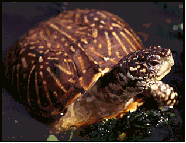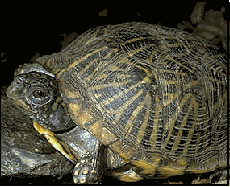|
Ornate box turtles are among the most sensitive and difficult of North American species to maintain successfully. We do not recommend this species for beginners. They inhabit a variety of environments, from grassy plains to damp forest floors. They make extensive use of burrows and microclimates. Glass aquarium tanks are categorically not appropriate for this species. They do best in carefully landscaped outdoor enclosures, or in large, indoor terraria with adequate substrate depth. For a substrate, we recommend light peat-based potting compost mixed with damp sphagnum moss. This should be at least 3-4" (75-100 mm) deep. It is imperative that Ornate box turtles are not allowed to become dehydrated - so dry tanks with excessive heat are a major source of problems. Ensure that box turtle habitats are provided with plenty of shade, have a shallow 'soaking' tray of fresh, clean water permanently available, and that temperatures are maintained from 80-85 ºF in one area to approximately 70 ºF in another. On no account over-heat or allow dehydration to occur. Spray the area regularly and ensure that the substrate retains adequate humidity at all times. Environmental problems usually manifest as swollen and infected eyes, ear abscesses and kidney diseases. As virtually all box turtles sold are wild-caught, parasitic diseases are also very common. Look out for Bot fly larvae infections, flagellate infestations and nematodes (intestinal 'worms'). All will require treatment from a specialist veterinarian. Ornate box turtles are highly carnivorous. Provide calcium-dusted crickets, mealworms, waxworms and earthworms on a regular basis. Pinkie mice are also very important. Over-ripe fruits and green-leaf salads are also essential.
|
|




